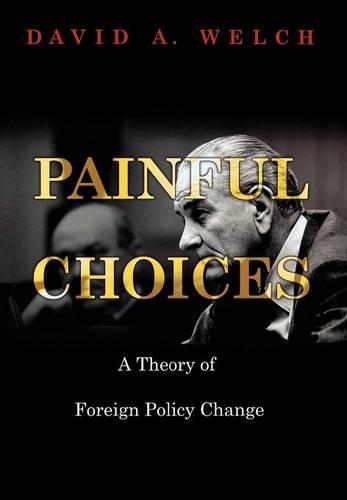
Painful Choices: A Theory of Foreign Policy Change
(Hardback)
Available Formats
Publishing Details
Painful Choices: A Theory of Foreign Policy Change
By (Author) David A. Welch
Princeton University Press
Princeton University Press
14th November 2005
United States
Classifications
Professional and Scholarly
Non Fiction
327.101
Physical Properties
Hardback
288
Width 152mm, Height 235mm
539g
Description
Under what conditions should we expect states to do things radically differently all of a sudden In this book, David Welch seeks to answer this question, constructing a theory of foreign policy change inspired by organization theory, cognitive and motivational psychology, and prospect theory. He then "test drives" the theory in a series of comparative case studies in the security and trade domains: Argentina's decision to go to war over the Falklands/Malvinas vs. Japan's endless patience with diplomacy in its conflict with Russia over the Northern Territories; America's decision to commit large-scale military force to Vietnam vs. its ultimate decision to withdraw; and Canada's two abortive flirtations with free trade with the United States in 1911 and 1948 vs. its embrace of free trade in the late 1980s. Painful Choices has three main objectives: to determine whether the general theory project in the field of international relations can be redeemed, given disappointment with previous attempts; to reflect on what this reveals about the possibilities and limits of general theory; and to inform policy.Welch argues that earlier efforts at general theory erred by aiming to explain state behavior, which is an intractable problem. Instead, since inertia is the default expectation in international politics, all we need do is to explain changes in behavior. Painful Choices shows that this is a tractable problem with clear implications for intelligence analysts and negotiators.
Reviews
Winner of the 2008 Best Book Award, International Security Studies Section of the International Studies Association "David Welch is to be commended for developing an ambitious theory that recognizes that humans, not factors, make decisions, and that they are affected by history and psychology."--Max Paul Friedman, Political Science Quarterly "Welch's theory is original and merits further testing against other cases of foreign policy change. Political scientists and foreign policy practitioners alike would benefit from reading this lucidly written book."--Guy Ziv, International Relations and Political Economy "Well written and accessible to non-specialists... Welch's skillful use of historical materials should please historians in particular... Welch has made a substantial contribution to international relations theory with this book."--Barbara Farnham, International History Review
Author Bio
David A. Welch holds the George Ignatieff Chair of Peace and Conflict Studies at the University of Toronto. He is the author of "Justice and the Genesis of War", winner of the 1994 Edgar S. Furniss Award for an Outstanding Contribution to National Security Studies.
